(Above) Refugees work as local project leaders
The area known as Cox’s Bazar, on the south-eastern tip of Bangladesh, is home to one of the largest refugee camps in the world. Around a million Rohingya refugees currently reside in an area of 20 square kilometres. In 2017, the Rohingya people were violently driven from their homes in Myanmar and fled hastily, often without any time to collect belongings. The host country of Bangladesh generously opened its border and was quick to offer whatever assistance it could. The government of Bangladesh promptly mobilized resources through international and local organizations in order to respond to this massive humanitarian crisis.
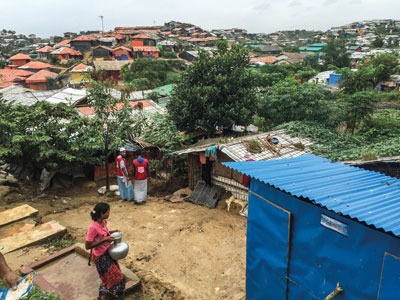 Visiting residents of the refugee camp to assess needs
Visiting residents of the refugee camp to assess needs
After fleeing violence in Myanmar, the Rohingya refugees have had to live through the relentless seasonal monsoon rains regularly experienced in Bangladesh, as well as the occasional cyclone. They have also faced flooding, landslides, collapsed or damaged shelters, contaminated water and overflowing latrines (toilets). It’s clear that with such a high concentration of people, any disease outbreak has the potential to kill thousands.
The larger camp has been divided into a number of small camps to make it manageable. Various non-governmental organizations (NGOs) and faith-based organizations have put in place arrangements to assist the government in the different camps. Many of the United Nations organizations have taken the lead in co-ordinating the emergency response in each camp.
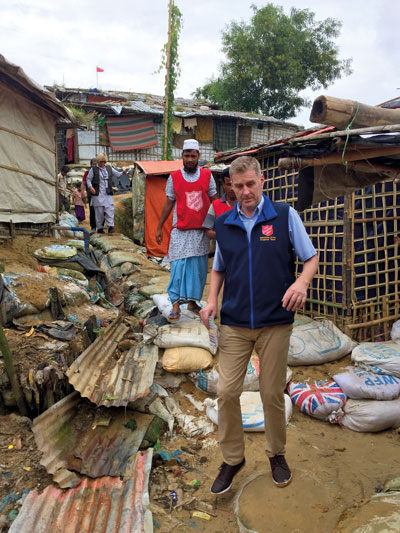 Lieutenant Richard Bradbury and local project leaders make their way through the camp
Lieutenant Richard Bradbury and local project leaders make their way through the camp
The Salvation Army was able to play its part and worked in one particular camp (Camp 19) whose management is overseen by the International Office of Migration. As part of this co-ordinated effort, The Salvation Army supplied solar lamps to people living in the camp.
On many occasions, I have been privileged to visit and support a Salvation Army emergency team that is based in the camp. Led by my colleague, Victor Mondal, the team is simply amazing. Its members were not just physically bringing lights to people, but working alongside them. It was clear to me that their presence was bringing light to a dark situation.
Solar Kits
The immediate need for some form of lighting was identified by people in the camps and local government officials. Insufficient lighting in camps negatively affects peoples’ mobility, access to services and sense of safety. This is especially the case for older people, women, children and people with disabilities or health issues. Lack of lighting also makes conditions for everyday tasks such as cooking and eating meals difficult and even hazardous.
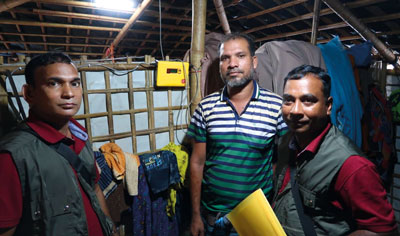 A newly fitted charger and light
A newly fitted charger and light
The Salvation Army worked with the most vulnerable people to provide access to light across the camp. It installed solar kits in 2,800 households, benefitting an estimated 11,200 vulnerable people. Each household received two LED lights, one battery and one high-output solar panel with accessories. The system will provide power for people to charge their mobile phones. For many refugees, a mobile phone is the only means of remaining in contact with relatives, especially those they left in difficult circumstances back in Myanmar.
Local refugees have taken on leadership roles in this project after being trained to prepare, install and repair the lighting system. Making use of the daylight and sunshine in Bangladesh, the solar systems provide a free, renewable and effective energy source, providing light during the nights and making life safer and more comfortable in the makeshift shelters.
A Dangerous Journey
During one of the monitoring visits to Camp 19, I talked with a mother who had fled her home and sought refuge in Bangladesh. Nasreen (not her real name) decided to run for her life after hiding in a neighbour’s home when members of the armed forces from Myanmar raided her village. Many of the men in her community were killed and she told me she had watched in horror from her hiding place as her own husband was knifed to death, his throat slit.
“She feels much safer being in her home and the light brings protection and comfort.... It also enables her family to spend time together in their shelter in the evening”
Nasreen escaped and embarked on a dangerous journey with her three children, trekking for days and miles to reach the relative safety of the camp. The story of her journey was harrowing, and Nasreen’s resilience and courage shone through as she recounted the events. She even told me that she was one of the “lucky ones,” as other mothers had seen their children raped and thrown on fires during the violent expulsion.
As a single mother, Nasreen is still worried about her own safety—a feeling that was exacerbated by the anxiety she experiences each day for her children. With pain etched on her face, and clearly still mourning the loss of her husband and her home, Nasreen told me about life in the camp, how she struggles to survive and how she feels pain at not being able to send her children to school.
 Children gather together for safety and company
Children gather together for safety and company
Completely self-sufficient back in her home village, Nasreen now feels her dignity has been ripped away, as she is forced to go regularly to the camp distribution centre to pick up food. She eats the same type of food over and over again, missing the fruits and vegetables from back home.
As we finish talking, Nasreen states that she is still scared, permanently traumatized, but becoming stronger as she pieces her life back together. She recognizes that it is much safer for her to stay in the camp while there is still conflict and tension in Myanmar, but longs for the day when she can return home to a peaceful environment. However, one year after arriving at the camp, Nasreen is obviously reconciling herself to the depressing fact that she is likely to be living in these conditions for a long time.
Protection and Comfort
What hit me as I took in these squalid conditions and talked to the people, including Nasreen, was not the physical environment, but the sheer scale of the camps and the helplessness of those who call them home.
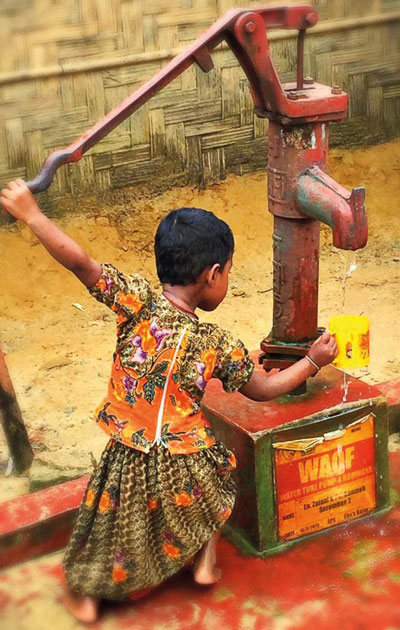 A young girl fetches water
A young girl fetches water
Like many other people, Nasreen is resigned to living in the camp for the foreseeable future. She told me that the light given by The Salvation Army makes life more manageable and—consequently—more hopeful. She is able to cook at night and eat together with her family. She feels much safer being in her home and the light brings protection and comfort.
It also enables her family to spend time together in their shelter in the evening. This, she says, is her favourite part of the day, as she and her children sit, chat and sometimes laugh and play games together, huddled around the light.
Above all, says Nasreen, she feels she is now providing a safe home environment for her children. Life is far from perfect, but as she and her children get used to living in the camp, and with the potential provided by their new power source, they have at least a glimmer of hope and normality, as well as the chance to lead a healthy and fulfilling life either where they are now or when—as she hopes—they eventually return home.
Lieutenant Richard Bradbury is the business administration officer in The Salvation Army’s Bangladesh Command and learning pathways co-ordinator for the South Asia Zone.
Reprinted with permission from All the World (April-June 2019).




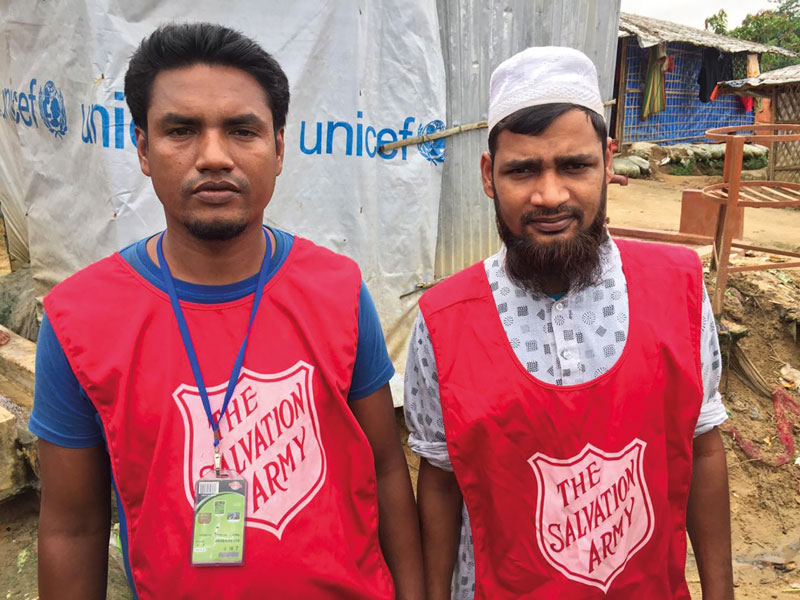


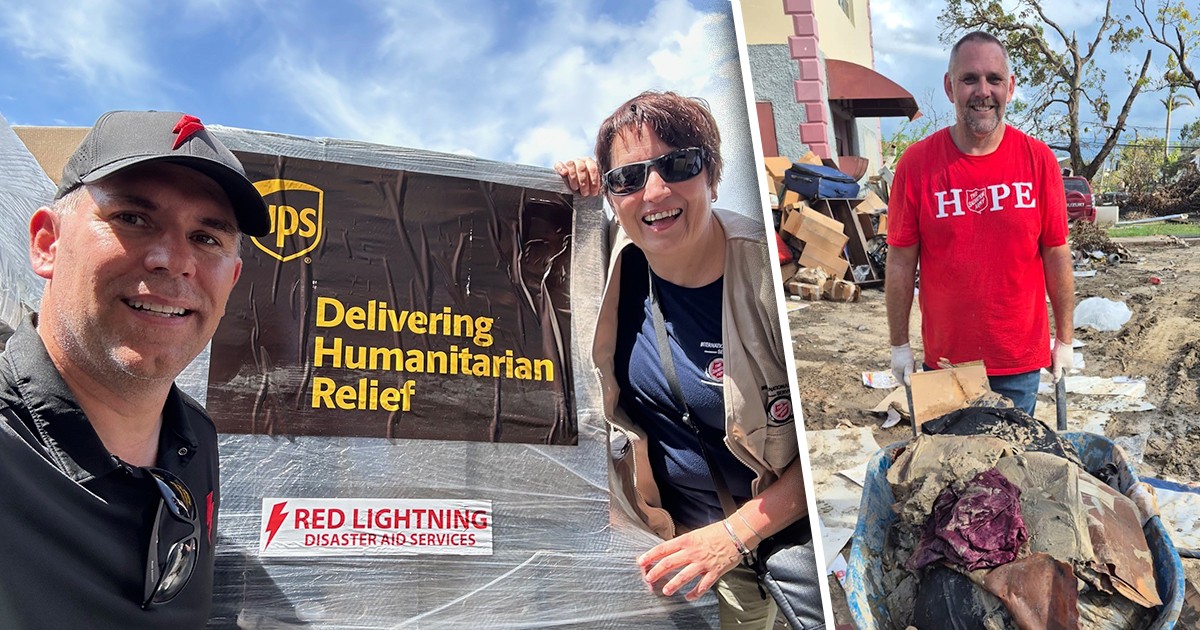


Leave a Comment